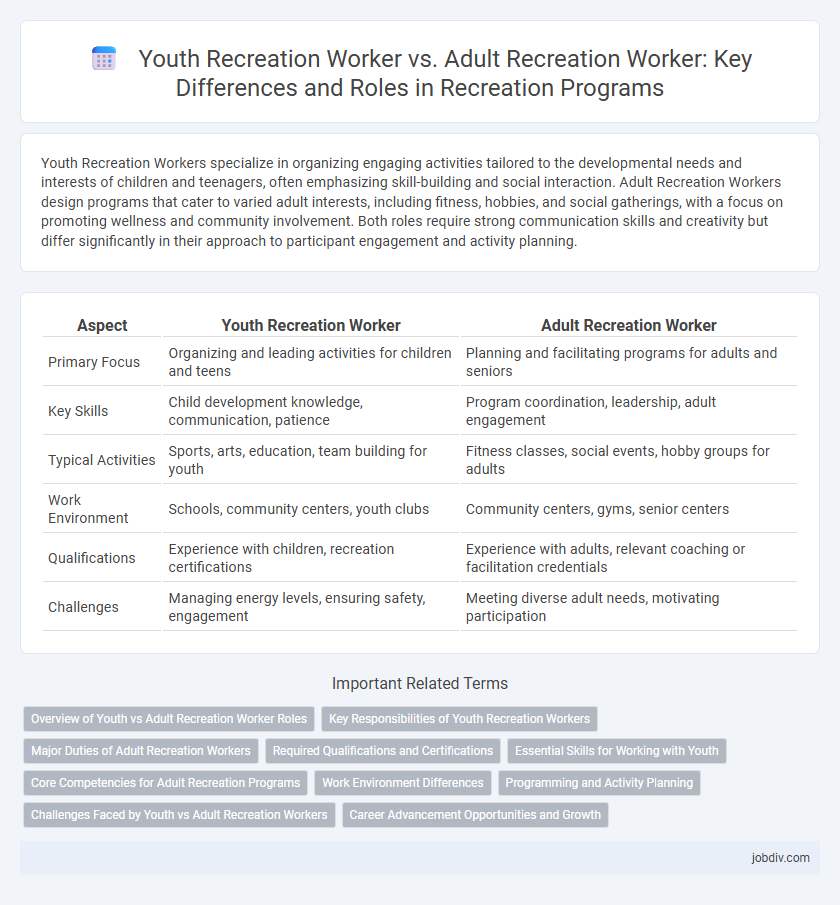Youth Recreation Workers specialize in organizing engaging activities tailored to the developmental needs and interests of children and teenagers, often emphasizing skill-building and social interaction. Adult Recreation Workers design programs that cater to varied adult interests, including fitness, hobbies, and social gatherings, with a focus on promoting wellness and community involvement. Both roles require strong communication skills and creativity but differ significantly in their approach to participant engagement and activity planning.
Table of Comparison
| Aspect | Youth Recreation Worker | Adult Recreation Worker |
|---|---|---|
| Primary Focus | Organizing and leading activities for children and teens | Planning and facilitating programs for adults and seniors |
| Key Skills | Child development knowledge, communication, patience | Program coordination, leadership, adult engagement |
| Typical Activities | Sports, arts, education, team building for youth | Fitness classes, social events, hobby groups for adults |
| Work Environment | Schools, community centers, youth clubs | Community centers, gyms, senior centers |
| Qualifications | Experience with children, recreation certifications | Experience with adults, relevant coaching or facilitation credentials |
| Challenges | Managing energy levels, ensuring safety, engagement | Meeting diverse adult needs, motivating participation |
Overview of Youth vs Adult Recreation Worker Roles
Youth Recreation Workers specialize in developing programs that promote social, physical, and educational growth for children and teens, focusing on age-appropriate activities and safety. Adult Recreation Workers design and manage recreational activities tailored to mature participants, emphasizing wellness, social engagement, and skill-building opportunities. Both roles require strong communication skills and the ability to adapt programming to meet the distinct needs of their respective age groups.
Key Responsibilities of Youth Recreation Workers
Youth Recreation Workers primarily focus on organizing and leading activities tailored to children and teenagers, ensuring programs promote physical, social, and emotional development. They collaborate with schools and community organizations to create safe, engaging environments that foster skill-building and positive peer interactions. Unlike Adult Recreation Workers, who generally facilitate recreational activities for mature participants, Youth Recreation Workers emphasize mentorship, supervision, and age-appropriate program planning.
Major Duties of Adult Recreation Workers
Adult Recreation Workers primarily design and implement programs tailored to the interests and physical abilities of adults, such as fitness classes, social events, and leisure activities. Their duties include coordinating schedules, managing facility resources, and ensuring participant safety during activities. They also assess community needs to create inclusive and accessible recreational opportunities that promote well-being and social engagement among adult populations.
Required Qualifications and Certifications
Youth Recreation Workers typically require certifications such as CPR, first aid, and child development training, along with a background in youth counseling or education. Adult Recreation Workers often need certifications in CPR and first aid as well but require additional training in adult fitness, wellness coaching, or senior care. Both positions prioritize strong communication skills and experience in recreational program planning tailored to their specific age groups.
Essential Skills for Working with Youth
Youth Recreation Workers must excel in communication, empathy, and conflict resolution to effectively engage adolescents and foster a supportive environment. They require strong organizational skills and creativity to design age-appropriate activities that promote physical, social, and emotional development. Understanding youth psychology and maintaining patience are critical for addressing behavioral challenges unique to younger participants.
Core Competencies for Adult Recreation Programs
Youth Recreation Workers excel in engaging younger demographics through dynamic, interactive activities tailored to developmental needs, emphasizing creativity and energy. In contrast, Adult Recreation Workers require core competencies in program planning, risk management, and interpersonal communication to address diverse adult interests and ensure inclusive environments. Mastery of conflict resolution, leadership, and adaptability specifically enhances the effectiveness of adult recreation programs.
Work Environment Differences
Youth recreation workers primarily operate in schools, community centers, and youth clubs, focusing on programs tailored to children and adolescents. Adult recreation workers typically work in fitness centers, retirement communities, and corporate wellness programs, catering to the needs of adult populations. The work environment for youth workers often involves managing dynamic group activities and ensuring child safety, whereas adult workers emphasize fitness goals and social engagement in more structured settings.
Programming and Activity Planning
Youth Recreation Workers specialize in creating age-appropriate programs that emphasize skill development, social interaction, and physical activity tailored to children and teenagers. Adult Recreation Workers focus on organizing diverse activities that promote wellness, social engagement, and relaxation for adults, often incorporating fitness classes, hobby groups, and community events. Both roles require strong programming skills, but youth-focused planning prioritizes developmental milestones while adult programming centers on enhancing quality of life and promoting lifelong learning.
Challenges Faced by Youth vs Adult Recreation Workers
Youth recreation workers often face challenges in managing diverse developmental stages and addressing the unique social-emotional needs of adolescents, which requires specialized communication and engagement strategies. Adult recreation workers encounter difficulties related to accommodating varying physical abilities and coordinating activities that suit a broad age range while ensuring safety and inclusivity. Both roles demand adaptability, but youth workers must focus more on fostering growth and resilience, whereas adult workers emphasize accessibility and sustaining long-term participation.
Career Advancement Opportunities and Growth
Youth Recreation Workers often gain specialized skills in child development and program planning, which can lead to roles such as Youth Program Coordinator or Child Services Manager, offering clear pathways for career advancement. Adult Recreation Workers frequently develop expertise in fitness instruction, event management, and community engagement, enabling progression to positions like Recreation Supervisor or Wellness Program Director. Both career paths provide growth opportunities through certifications, continued education, and experience in leadership roles within recreational facilities.
Youth Recreation Worker vs Adult Recreation Worker Infographic

 jobdiv.com
jobdiv.com